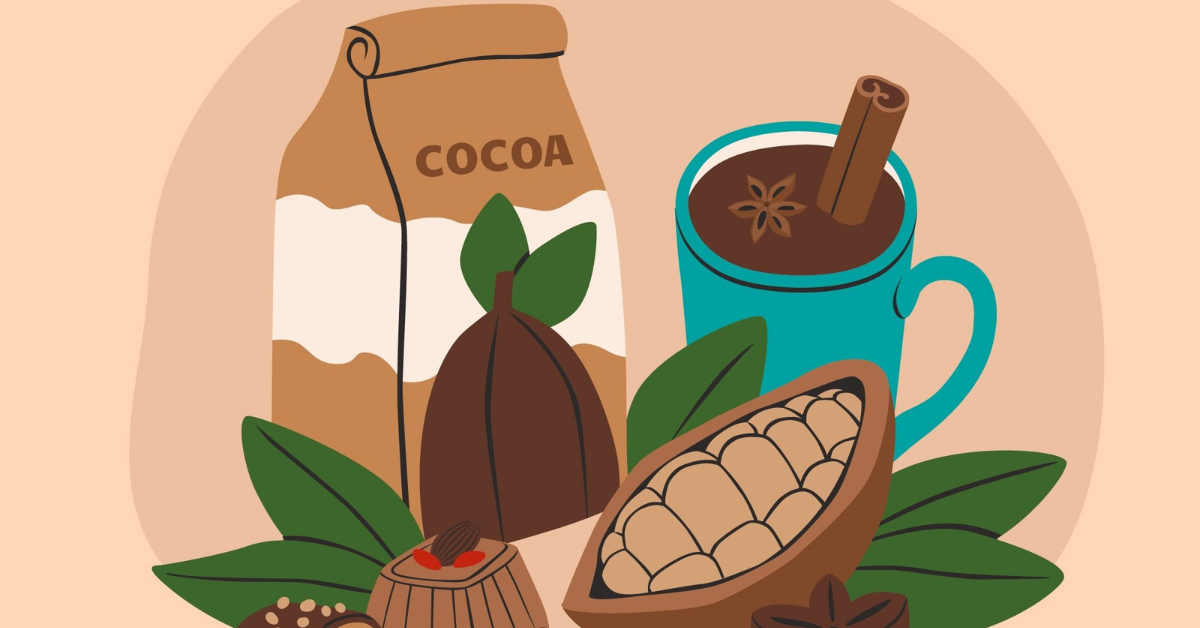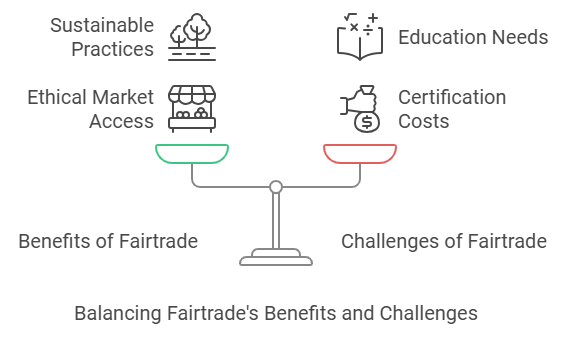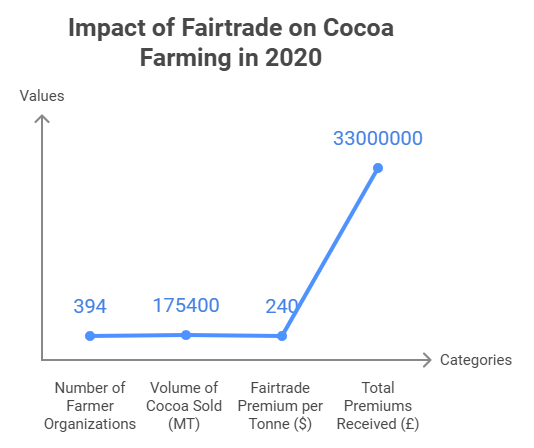Contact: +91 99725 24322 |
Menu
Menu
Quick summary: Discover how Fairtrade cocoa uplifts farmers, enhances sustainability, and gives chocolate lovers ethically sourced treats. Learn the impact of fair pricing, ethical standards, and global change.

When you unwrap a bar of chocolate, do you ever wonder where those rich, velvety flavors come from? Beyond satisfying cravings, cocoa has a story worth telling—one rooted in the lives of millions of farmers worldwide. But not all stories of cocoa production are sweet. Many farmers face challenges like poverty, exploitation, and environmental threats. Fairtrade Cocoa is a movement that aims to change this narrative and empower those at the heart of our favourite treat.
Millions of cocoa farmers toil tirelessly under harsh conditions but still fail to earn a sustainable income. On average, cocoa farmers receive a mere 6% of the final price of a chocolate bar.
Unfair trade terms worsen poverty and fuel ongoing issues such as discrimination, exploitation, and deforestation, jeopardizing the wellbeing of cocoa farming communities and the sustainability of cocoa production itself.
Fairtrade establishes social, economic, and environmental criteria for both companies and farmers. For companies, this means ensuring a fair price for the goods, while for farmers, it encompasses protecting workers’ rights and the environment.”
Key Takeaways
Cocoa is primarily grown in warm and humid regions, mainly in West Africa, Latin America, and Southeast Asia. Côte d’Ivoire stands as the top global producer and exporter.
Approximately six million individuals globally rely on cocoa cultivation for their income.
Cultivating cocoa is labor-intensive. Farmers harvest the ripe cocoa pods from the trees and open them to extract the wet beans. These beans undergo fermentation for up to seven days before being precisely dried. After drying, the beans are cleaned, packaged, and transported. Despite the extensive efforts involved, numerous cocoa farmers live in poverty, even in a billion-dollar industry.
Fairtrade Cocoa is cocoa that meets rigorous social, economic, and environmental standards set by the Fairtrade International certification. This certification ensures:
Essentially, Fairtrade is about creating a fairer, more ethical cocoa industry that works for everyone—producers, traders, and consumers.
Most cocoa farmers have never tasted chocolate, but farmers from a Fairtrade certified co-operative in Ghana own 44% of the Divine chocolate company.
The cocoa sector faces numerous obstacles hindering its long-term viability. These include pervasive poverty, deforestation, gender disparities, child labor, and forced labor.
Fairtrade Cocoa is one step toward addressing these issues and offering farmers a more stable and dignified livelihood.
The Fairtrade system is built around a few key principles:
a) Fair Pricing and Premiums
Fairtrade ensures that farmers receive a minimum price for their cocoa beans. This protects them from market crashes and allows them to plan for the future. Additionally, Fairtrade provides a premium—extra funds that communities can invest in vital projects like clean water, healthcare, education, or better farming equipment.
b) Empowerment and Cooperative Support
Fairtrade encourages farmers to organize into cooperatives. This collective approach strengthens their negotiating power, offers access to training and resources, and provides a platform for sharing knowledge. Empowered farmers can then take greater control over their own lives and businesses.
c) Sustainability and Environmental Standards
Fairtrade Cocoa farmers follow strict guidelines that promote environmentally friendly practices. These include banning harmful pesticides, promoting reforestation, and ensuring land is managed sustainably to protect biodiversity.

In Ghana, a women-led cooperative transformed their community using Fairtrade premiums. With their funds, they built a school, provided scholarships, and established a healthcare clinic. These women not only increased their income but also lifted their entire community. Cocoa farmers in Ghana are increasingly adopting agroforestry practices, integrating diverse tree species with cocoa crops to boost resilience, improve soil health, and promote sustainability.
Fairtrade farmers in the Dominican Republic are using environmentally friendly farming techniques and replanting trees to offset the impact of cocoa production. This not only helps the planet but also increases soil fertility, boosting cocoa yields.

Fairtrade certification can be a valuable tool for businesses aiming to comply with the European Union Deforestation Regulation (EUDR).
1. Traceability and Transparency: Fairtrade certification requires clear documentation and traceability of products throughout the supply chain. By ensuring that products are traceable from their source (often in tropical regions where deforestation risks are higher), it helps companies meet the EUDR’s requirement for transparency in sourcing raw materials like cocoa, coffee, palm oil, soy, and rubber. This makes it easier to prove that products are not linked to deforestation.
2. Sustainable Sourcing: Fairtrade focuses on sustainable production practices, including environmental protection. Certified producers must adhere to standards that protect biodiversity and reduce environmental impact. This aligns with the EUDR’s objective to prevent deforestation and forest degradation associated with the production of key commodities.
3. Third-Party Verification: Fairtrade certification involves independent verification of environmental and social practices. This third-party audit can serve as proof of compliance with both Fairtrade standards and the EUDR’s due diligence obligations, especially when companies need to demonstrate that their products do not contribute to deforestation.
4. Reducing Supply Chain Risks: Fairtrade certified products are often sourced from well-established, responsible farmers and cooperatives who are committed to maintaining sustainable practices. This can help reduce the risk of non-compliance with the EUDR, ensuring that the raw materials used in the products are deforestation-free.
5. Consumer Trust and Market Access: Being Fairtrade certified can enhance a company’s credibility, demonstrating commitment to sustainability. This is particularly important under the EUDR, as businesses must show their customers that they are not contributing to environmental harm. This can also help companies maintain market access, particularly in the EU, where regulations around sustainability and deforestation are becoming stricter.
By leveraging technology solutions, Fairtrade cocoa initiatives can scale their impact, providing better transparency, fair compensation, and sustainable practices. From farmer empowerment to consumer trust, technology bridges the gap between ethical intentions and measurable outcomes, paving the way for a more equitable and resilient cocoa industry.
A Nigerian firm utilized TraceX’s solutions to enhance data accuracy, achieve EUDR compliance, improve operational efficiency, and gain full supply chain traceability, reinforcing their dedication to quality and sustainable sourcing.
The TraceX Traceability and Compliance Platform leverages blockchain technology to offer end-to-end visibility and transparency across the food and agriculture supply chain. Designed for agribusinesses, brands, and sustainability initiatives, this platform helps ensure product authenticity, trace origins, and monitor compliance with various regulatory standards, including sustainability and deforestation regulations.
With TraceX, stakeholders can trace the journey of a product from farm to fork, capturing data at every critical touchpoint. It simplifies due diligence, verifies sourcing claims, and promotes ethical practices by creating an immutable record of transactions. This boosts consumer trust, enhances supply chain efficiency, and aids in meeting complex regulatory and sustainability requirements.
Fairtrade cocoa empowers farmers by providing fair prices, better working conditions, and sustainable practices while giving chocolate lovers ethically sourced treats. Supporting Fairtrade ensures a brighter future for cocoa-growing communities and a more conscious choice for consumers, transforming each bite of chocolate into a powerful statement for equality and environmental care.
Fairtrade cocoa guarantees farmers fair prices for their crops, offers a Fairtrade Premium for community development, and promotes better working conditions and sustainable agricultural practices.
Fairtrade standards encourage sustainable farming, which reduces deforestation, promotes biodiversity, and minimizes chemical use, contributing to a healthier environment.
By choosing Fairtrade chocolate, consumers support ethical practices, help improve farmers’ lives, and advocate for environmental sustainability—all while enjoying high-quality, delicious chocolate.
